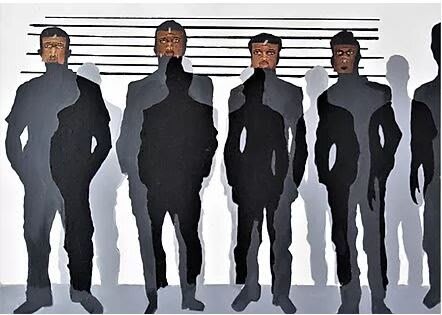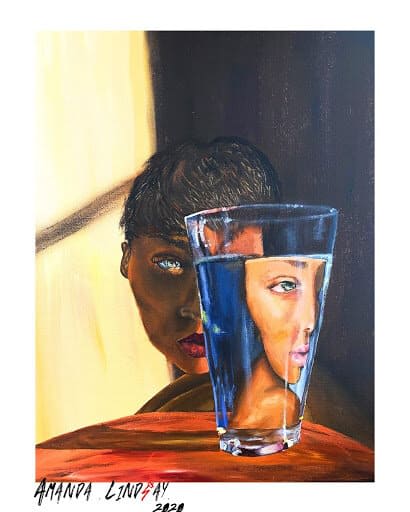Recently, I had the pleasure of speaking with my friend and collaborator, Amanda Lindsay. Lindsay is a Fine Arts Major at NYU Steinhardt. She uses her perspective, talent, Instagram platform, and voice to spread educational resources and raise donations for the Black Lives Matter movement.
Lindsay’s work is symbolic of a new frontier of using art and social media platforms as a tool for catalyzing change. Amanda and I discussed what it means to be an artist through a chaotic yet exciting time in history, how we have learned to cope, process, produce work, and have our voices heard.
Our Chat With Amanda
How did you manage the transition to remote learning?
It was terrible. We lost our studio, obviously. 2D Design class was fine, but then when we got to 3D and interdisciplinary art, it was so weird. Normally, we would be stacking furniture and taking photos of it and building forts. And now, being remote, it felt like a waste of time.
Where were you during the quarantine? What was that like as an artist?
After spending a month in New York, my mom freaked out because at that point, we were the center of the global pandemic. She wanted me back in Chicago, but I couldn’t go back into my house since my grandparents lived there and I didn’t want to put them at risk. My mom ended up renting out the house across the street where my best friend and I went and lived for a month.
Since I had the place pretty much to myself, I was able to use one of the rooms as a studio. Painting every day gave me a sense of purpose, especially during the school days. Everything was just so mundane, like walking through a fog. First, I was painting indoors, then I transitioned to outdoors, which was amazing. Being able to go and paint for myself allowed me to create my painting entitled Disassociation.
Considering the killing of George Floyd and the broader movement, what is the intersection of art and activism in your work?
To me, this week was a huge learning curve. I’ve always been aware of the issues, but not like this. Previously, I’ve been a little bit removed from them because of my own privilege. Growing up, I was in boarding school, and then I went to a private university. Then came the pandemic, and now, this movement has been such a learning experience. It’s really been a wake-up call. The death of George Floyd was enraging. I felt horrible that people were just sending around a video of a man dying. I knew I had to get involved and do something.

Yeah, I totally agree, at first, as a white woman, I was nervous because I didn’t know how to get involved and what it meant to be an appropriate ally. Then I learned how important it is to speak up because this is not just a black issue- it’s a universal problem in which everyone, regardless of race or background, needs to participate in. I really learned so much from your initiative and method behind social media activism.
A lot of which come from that same privileged background. Honestly, in the past, being a Black woman, I hated being the spokesperson because people would automatically put me in that position without my permission. However, George Floyd was a breaking point, I realized I have a duty. I wanted to use my platform to uplift the black community as well as inform and educate my followers, many of whom come from privileged backgrounds. That’s when I started selling my prints for BLM.
Then, I went into doing research about the different organizations that I wanted to donate to. Campaign Zero is run by a black woman. They have researchers lobbying politicians. The organization is a good pipeline to legal action. So, proceeds from my prints go towards Campaign Zero.
I have never worked in multimedia before. Now, in this hectic time, I was able to create a multimedia piece entitled, “Get Name.” All of the images are pulled from my grandma’s old Ebony Magazines, and a few are from the Black Lives Matter and Black Panther movements.
Painting and working on art calms me down and puts me into a meditative state. I worked in my backyard and just had frequencies playing, and it just was a purely meditative, restorative experience.

Yeah, I feel like even for myself as an artist, this time has been a real turning point for the mood and direction for my work. I think many of us sense that the world that is going to reopen will be different than the world we left. What are some changes you would like to see?
I love this question. Okay, the first step is defunding the police. Police training requires 110 hours training for weaponry and only six hours of training for conflict resolution. I think the police system is just so innately corrupt. It’s always going to be corrupt because of over-policing in certain communities. Even here in Chicago, where we have a black mayor who is allocating $30 million per year to the police. She’s the ex-police chief, so of course, her spending priorities are policing, rather than redirecting funding into areas such as education, that need funding and could make a real difference.
Recently, I saw this amazing post that suggested seven to nine alternatives to policing. if you have an emergency, you call 311. If there’s a mental health emergency, you get a mental health professional. If there’s a conflict, then you get a conflict resolution specialist involved. As we move forward. I hope to see these changes enacted.



